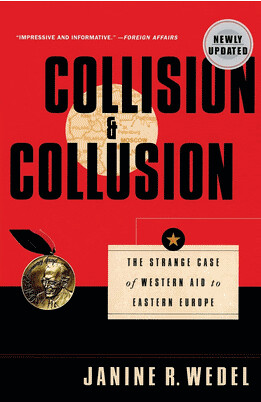Review, Janine Wedel, Collision and Collusion (1)
Janine Wedel, Collision and Collusion, Palgrave Macmillan (2001)

This book is extremely important for readers interested in understanding the present crisis in Russian relations with the West. Part of the reason it is valuable is that it was published at the dawn of the Putin Era, in the very year that the United Russia Party was founded. This book therefore is a look at the future from before the later revival of the Cold War.
THE PREMISE
Still, it's very clearly a polemical book. The author, Janine R. Wedel, soon after became a professor at George Mason University.1 An obvious implication of her subsequent books was that market economies represent an ideal of fairness, that can be achieved (and usually has been in the past). The author's critique of collusion in Central/Eastern Europe (CEE) was a prologue to her own private campaign against collusion in the West—where government officials retire to seven-figure salaries at the firms they erst regulated.2 Whereas her early work on USAID/HIID scandals in CEE focused on unethical/illegal collusion by Americans on foreign soil, her later work acknowledged this as a problem afflicting the West as well—indeed, the problem of the modern West.
As a consequence, while the book delves into sordid details about the administration of US aid to to CEE, there's no effort at balance: every decision made by US administrators of the aid is alleged to be wrong. I was struck by the spectacular one-sidedness: several times, comparing US assistance to EU assistance, she describes USAID programs with quotes from a partisan critic, while describing European programs in the words of the ministries that conceived them.3 More confusingly, the difference between USAID and the EU member states was not quite as cut-and-dried as she says. A lot of overseas development aid (ODA) was multilateral, flowing through institutions like the World Bank Group, the IMF, and the EBRD. Bilateral aid from Europe was more likely to take the form of trade credits rather than grants. Once one sorts out all this, the main difference was that the US government sought to bypass governments, and the European governments (in Central Europe, especially) did not (p.37). A logical problem with this is that European governments were relying on internal structures (their own finance ministries) to manage aid programs in support of governments directly—an intrinsically opaque system, which explicitly pursued close personal ties between the donor government and the officials of the government that was supposed to be reformed.
THE PREMISE
Still, it's very clearly a polemical book. The author, Janine R. Wedel, soon after became a professor at George Mason University.1 An obvious implication of her subsequent books was that market economies represent an ideal of fairness, that can be achieved (and usually has been in the past). The author's critique of collusion in Central/Eastern Europe (CEE) was a prologue to her own private campaign against collusion in the West—where government officials retire to seven-figure salaries at the firms they erst regulated.2 Whereas her early work on USAID/HIID scandals in CEE focused on unethical/illegal collusion by Americans on foreign soil, her later work acknowledged this as a problem afflicting the West as well—indeed, the problem of the modern West.
As a consequence, while the book delves into sordid details about the administration of US aid to to CEE, there's no effort at balance: every decision made by US administrators of the aid is alleged to be wrong. I was struck by the spectacular one-sidedness: several times, comparing US assistance to EU assistance, she describes USAID programs with quotes from a partisan critic, while describing European programs in the words of the ministries that conceived them.3 More confusingly, the difference between USAID and the EU member states was not quite as cut-and-dried as she says. A lot of overseas development aid (ODA) was multilateral, flowing through institutions like the World Bank Group, the IMF, and the EBRD. Bilateral aid from Europe was more likely to take the form of trade credits rather than grants. Once one sorts out all this, the main difference was that the US government sought to bypass governments, and the European governments (in Central Europe, especially) did not (p.37). A logical problem with this is that European governments were relying on internal structures (their own finance ministries) to manage aid programs in support of governments directly—an intrinsically opaque system, which explicitly pursued close personal ties between the donor government and the officials of the government that was supposed to be reformed.


